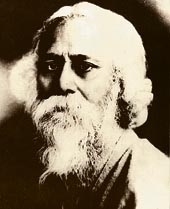 |
| Rabindranath Tagore |
What better way to celebrate 75 years of Tagore’s Gitabitan (first published in 1931) than use its songs to treat those suffering from depression? That’s what city-based clinical psychologist Rajyasree Bandopadhyay is doing with Tagore numbers. It helps that she herself is a Rabindrasangeet exponent.
Bandopadhyay is not alone. Eye surgeon Abhijit Sen is among the doctors who have been using Rabindrasangeet in the operating theatre for more than half a decade. Sen used to play the songs at a low volume. Now, he increases the volume, some times at the instance of patients, who feel relaxed with the melody in the background.
Working on a project funded by the Union ministry of culture, Bandopadhyay chose Rabindrasangeet because of its potential to go with a gamut of moods and situations.
“Classical and instrumental music have been used for music therapy. I chose Rabindrasangeet as my patients are mostly Bengalis and a statistical analysis on random subjects revealed that many of them would love to listen to this genre of music,” says Bandopadhyay.
As part of the analysis, the target group of depression patients were divided into two categories — one using medicine or undergoing pharmaco therapy and the other not being treated in any way. Bandopadhyay chose three moods — anger, happiness and sorrow and identified Rabindrasangeet pertaining to these three categories. Numbers like Amar shakal dukher pradip and Aaji bijono ghare nishito raate are used to help patients relate to a loss and overcome feelings of loneliness and sorrow, while songs like Edin aaji kon ghore go and Jagate ananda yagne “throw open the gates of happiness and help listeners travel into a world of fun and love”.
The patients are made to listen to the songs. At the end of each session, the effect of the songs on the patients is assessed through counselling. The study has found that Rabindrasangeet stimulates memory and emotions and in the social context, promotes stress reduction and improves self-esteem.
The universal acceptance of Rabindrasangeet and personal preference prompted Sen’s choice. “Most people are overcome by nerves in the operating theatre. Moreover, many of my patients are aged and the operation is done after local anaesthesia. Rabindrasangeet helps to get their mind off the surgery,” explains Sen.
Counsellor Kanchan Gurtu hails the therapeutic use of Rabindrasangeet as highly innovative. “I have heard of music being used as a supplementary device (along with medicines and general counselling) in treating depression, but have hardly come across cases where it is used as the only form of treatment,” he states.










